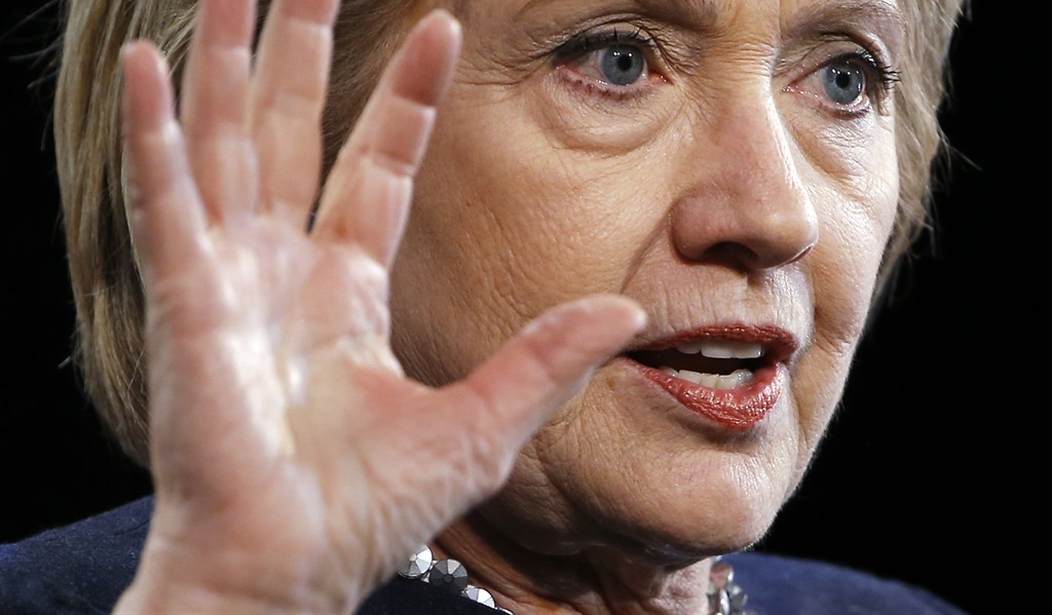As both Ed and Katie noted this morning, the New York Post is reporting that the Federal Bureau of Investigation's ongoing, expanded probe into Hillary Clinton's potential crimes has turned to the question of how
Advertisement
Recommended
Advertisement
Whatever the findings from that part of the probe, intelligence-community investigators believe it is nearly certain that Mrs. Clinton’s server was hacked, possibly by the Chinese or the Russians...from her direction that classification rules be disregarded, to the presence on her personal email server of information at the highest level of classification, to her repeated falsehoods of a sort that juries are told every day may be treated as evidence of guilty knowledge—it is nearly impossible to draw any conclusion other than that she knew enough to support a conviction at the least for mishandling classified information. This is the same charge brought against Gen. David Petraeus for disclosing classified information in his personal notebooks to his biographer and mistress, who was herself an Army Reserve military intelligence officer cleared to see top secret information. The simple proposition that everyone is equal before the law suggests that Mrs. Clinton’s state of mind—whether mere knowledge of what she was doing as to mishandling classified information; or gross negligence in the case of the mishandling of information relating to national defense; or bad intent as to actual or attempted destruction of email messages; or corrupt intent as to State Department business—justifies a criminal charge of one sort or another.
Advertisement
Read the whole thing. But what to make of the Clinton campaign's oft-repeated refrain that according to the FBI, Hillary isn't "a subject of the investigation"? Former federal prosecutor Andy McCarthy explains how that "legal term of art" may -- or may not -- apply to the situation at hand, suggesting that this characterization represents a carefully-phrased technicality within the context of a politically-loaded case:
“Subject” is a term of art in criminal investigations. It refers to one of the three categories into which prosecutors fit every relevant actor. Subjects are people whose conduct is being scrutinized and who, depending on what evidence turns up, may or may not be charged. This distinguishes them from targets, who are suspects virtually certain to be indicted for an obvious crime; and from mere witnesses, whose interaction with a suspect suggests no criminality on their part (e.g., the teller in a bank hold-up, or the neighbor awakened by a fatal gunshot next door)...“Subject” is the ambiguous category. A subject has engaged in conduct that appears criminal but may have an innocent explanation. Cooperating makes sense if the subject’s account is likely to convince the government not to file charges. If not, cooperation is fraught with risk, and a competent lawyer will probably advise against it. If someone’s conduct is being investigated for potential wrongdoing, it is safe to assume that person is a subject of that investigation. Thus understood, Mrs. Clinton is not only a subject; she is the main subject. After all, the investigation centers on her mishandling of classified information via a private e-mail system that she improperly set up for all her government business and over which she well knew it was illegal to disseminate classified information. And if recent reporting is accurate, the investigation is now delving into potential corruption: the favorable treatment donors to her private foundation were given by the State Department she was running. Given that the investigation appears to be tracking her unique activities, how could she possibly not be a subject? What would otherwise be the point of investigating?
Advertisement
McCarthy proceeds to attempt to answer that question, laying out why Clintonworld can still get away with the "not a subject" line -- for now. He says "targets" and "subjects" are targets and subjects of grand jury investigations, and that no matter how intensive the criminal inquiry may be, the FBI itself cannot convene a grand jury on its own. Prosecutors are needed for that part of the process to swing into motion. "No Justice Department, no grand jury. No grand jury, no case — period," he writes, arguing that a tenuous, temporary compromise scenario is currently playing out:
On the one hand, the Obama administration does not want to be seen by the public as obstructing the FBI; on the other hand, President Obama does not want to be seen by his base as tanking the Democrats’ best shot at retaining the White House — the likely fallout if the Obama Justice Department signals that a formal, very serious criminal investigation is underway. So Obama is hedging his bets. He is letting the FBI investigate, but on its own, without Justice Department prosecutors and the grand jury. This frees the administration and the Clinton campaign to be, by turns, ambiguous and disingenuous about whether there really is a formal investigation going on.
This can't last forever, McCarthy contends. Ultimately, if the FBI gathers sufficient evidence, dominoes will begin to fall -- and if those dominoes are being propped up for political reasons, the American people will hear all about it.
Advertisement
Focusing on the question of who leaked the damning evidence outlined in a letter to Congress by the intelligence community Inspector General is a lame attempt to distract from...the damning evidence outlined in a letter to Congress by the intelligence community Inspector General. How journalists got their hands on the documents isn't the story here, and it it never will be.
Advertisement

























Join the conversation as a VIP Member